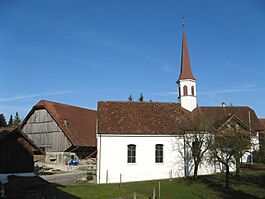Uezwil facts for kids
Quick facts for kids
Uezwil
|
||
|---|---|---|
 |
||
|
||
| Country | Switzerland | |
| Canton | Aargau | |
| District | Bremgarten | |
| Area | ||
| • Total | 2.44 km2 (0.94 sq mi) | |
| Elevation | 532 m (1,745 ft) | |
| Population
(Dec 2020 )
|
||
| • Total | 504 | |
| • Density | 206.6/km2 (535.0/sq mi) | |
| Postal code |
5619
|
|
| Surrounded by | Büttikon, Waltenschwil, Kallern, Sarmenstorf | |
Uezwil is a municipality in the district of Bremgarten in the canton of Aargau in Switzerland.
Contents
History
In 1936, a 4,500-year-old megalith dating from the Neolithic Age was discovered. Roman finds point to human habitation in the area during the classical period. Around 500, a settlement of Alamanni developed in the area. A village of this name was first documented in 1306 in a Habsburg land deed.
Geography
Uezwil has an area, as of 2006[update], of 2.4 square kilometers (0.93 sq mi). Of this area, 65.8% is used for agricultural purposes, while 28.4% is forested. The rest of the land, (5.8%) is settled.
Coat of arms
The blazon of the municipal coat of arms is Per pale Or three Arrows Gules in pale fesswise issuant and Azure.
Demographics
Uezwil has a population (as of 31 December 2020) of 504. As of 2008[update], 8.4% of the population was made up of foreign nationals. Over the last 10 years (1997–2007) the population has changed at a rate of 13.9%. Most of the population (as of 2000[update]) speaks German (97.5%), with English being second most common ( 0.8%) and French being third ( 0.6%).
The age distribution, as of 2008[update], in Uezwil is; 51 children or 12.4% of the population are between 0 and 9 years old and 48 teenagers or 11.7% are between 10 and 19. Of the adult population, 41 people or 10.0% of the population are between 20 and 29 years old. 58 people or 14.1% are between 30 and 39, 85 people or 20.6% are between 40 and 49, and 56 people or 13.6% are between 50 and 59. The senior population distribution is 45 people or 10.9% of the population are between 60 and 69 years old, 21 people or 5.1% are between 70 and 79, there are 6 people or 1.5% who are between 80 and 89,and there is 1 person who is 90 and older.
As of 2000[update], there were 7 homes with 1 or 2 persons in the household, 39 homes with 3 or 4 persons in the household, and 78 homes with 5 or more persons in the household. The average number of people per household was 2.72 individuals. In 2008[update] there were 105 single family homes (or 64.8% of the total) out of a total of 162 homes and apartments. There were a total of 0 empty apartments for a 0.0% vacancy rate. As of 2007[update], the construction rate of new housing units was 7.9 new units per 1000 residents.
In the 2007 federal election the most popular party was the SVP which received 48.8% of the vote. The next three most popular parties were the SP (13.1%), the CVP (13%) and the FDP (9%).
In Uezwil about 78% of the population (between age 25-64) have completed either non-mandatory upper secondary education or additional higher education (either university or a Fachhochschule). Of the school age population (in the 2008/2009 school year[update]), there are 28 students attending primary school in the municipality.
The historical population is given in the following table:
| Historical population | ||
|---|---|---|
| Year | Pop. | ±% |
| 1975 | 300 | — |
| 1980 | 293 | −2.3% |
| 1990 | 335 | +14.3% |
| 2000 | 364 | +8.7% |
Economy
As of 2007[update], Uezwil had an unemployment rate of 1.13%. As of 2005[update], there were 58 people employed in the primary economic sector and about 16 businesses involved in this sector. 6 people are employed in the secondary sector and there are 3 businesses in this sector. 11 people are employed in the tertiary sector, with 6 businesses in this sector.
As of 2000[update] there was a total of 199 workers who lived in the municipality. Of these, 156 or about 78.4% of the residents worked outside Uezwil while 13 people commuted into the municipality for work. There were a total of 56 jobs (of at least 6 hours per week) in the municipality. Of the working population, 3.9% used public transportation to get to work, and 60.7% used a private car.
Religion
From the 2000 census[update], 233 or 64.5% were Roman Catholic, while 77 or 21.3% belonged to the Swiss Reformed Church. Of the rest of the population, there was 1 individual who belonged to the Christian Catholic faith.




